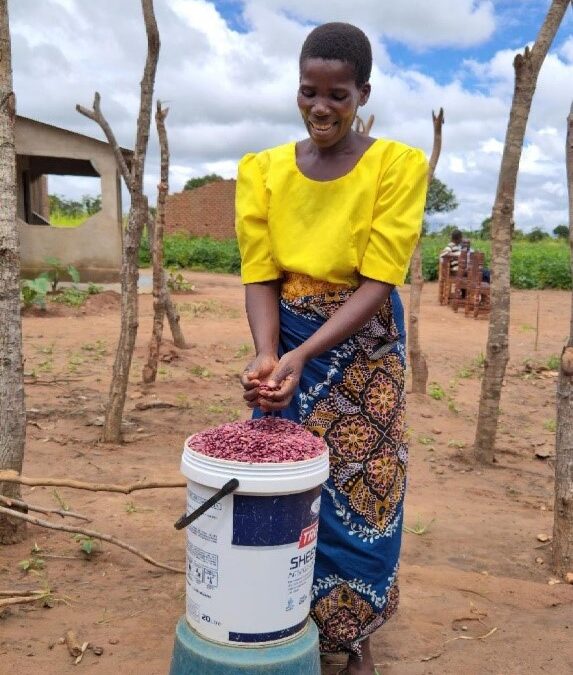By Yohane Chideya
Even though she has been farming beans for many years, raking yields seasons-in-seasons-out Esther Jere was still not satisfied. Her yields were never enough for her family of six to make ends meet.
Today, the middle aged farmer from Emfeni area in Malawi northern regional districts of Mzimba is no longer the same. After being selected under the Multi-Stakeholder Project (MSP) as one of the demonstration farmers for the new NUA45 variety bean seeds, she has seen her yields more than triple.
This was after the Alliance of Bioversity International & CIAT provided the Catholic Development Commission (CADECOM) in Malawi with NUA45 bean seeds to be used as a demonstration plots, with Mzimba district being among the districts that was selected to be part of the initiative.
“I got one kilogram of NUA45 variety of beans from CADECOM through CIAT. This is NUA45 type of beans. After planting, I ended up harvesting 18 kilograms, I reserved five kilograms as seed and used the rest. After replanting I have harvested 60 kilograms. My life has really changed for the better. NUA45 is by far much better than other varieties we used to plant in the past because this variety is giving us (farmers) bumper yields.’’ Explains Jere.
This, she says was the case despite planting the variety in summer season, a period where the country receives little or no rainfall.
Bean farming as a game changer
Researchers under the MSP ascertains that the NUA45 cultivar, that has a yield potential of 2.9 tons per hectare, has been widely adopted since it was released on the market regionally in Malawi, Swaziland, Zambia, and Zimbabwe.
Similarly, experts are of the view that common bean could be critical to Malawi’s food security and poverty reduction, as cultivation of improved varieties could be a real game-changer. Studies have shown that smallholder farmers have limited scope to generate cash but their venture in legume production may offer a valuable source of income. However, these farmers face challenges accessing improved variety and certified seeds.

Esther Jere, a bean farmer in Malawi’s Mzimba District has enjoyed success in growing a new bean variety provided through the multi-stakeholder platform she has joined. Photo courtesy of Eunice Magwaya.
Concerted efforts
Upon realizing that there was low production and accessibility of improved bean varieties, different stakeholders proposed a collaboration for increased productions of pre-basic, basic and certified seeds, for improved and more beneficial bean business in the country.
Because of this, the players in the MSP agreed to intensify seed production of other bean varieties ad decided that this be guided by market demands. Established in 2019, through the bean corridor approach, the platform seeks to respond to bean variety demand through MSPs, with funding from USAID through the Feed the Future Innovation Lab for Legume Systems Research at Michigan State University.
Grain traders on the other hand, have been partnering with farmers in the platform and supporting them to access quality seed of improved varieties through soft loans,
Milele Agro-processors and Afriseed are the two companies that have supported farmers with seed of the haricot bean varieties through loans. Since then, farmers have been able to access quality seed of the right variety which was not possible before.
Operations Manager for Milele Agro-processors, Ngale Phekani says through this approach, they would like to meet the requirements of the markets in terms of volumes and quality. “We are targeting the export market and the market we have is unique, it has specific demands, and these can only be met through quality seed.’’ Says Phekani.
Furthermore, to address the increased demand for the certified bean seeds, one of the local seed production companies , Seed Co Malawi pledged to produce 40 metric tons of certified seed in 2023 alone.
Consequently, the platform has opened bean grain market opportunities through market linkages such that offtakers have secured grain market offer of 10,000 metric tons. This as excited grain offtakers including Managing Director of Afriseed, Grace Mijiga Mhango, who is also the President for the Grain Traders Association of Malawi, She says they have intensified recruitment of bean growers in the country’s production hubs to reap from the market opportunities,
‘’ The Multi-Stakeholder platform is a unique market led business model that has recognized participation of private sector as key to sustained markets ans broadens the market base for bean commodities,’’ says Mhango.
MSP’s future prospects
Following the impact that MSP has had on farmers in the recent months and the enormous potential that must improve bean farming in Malawi and neighboring countries, different players are impressed with the strides the project has made within the shortest time possible.
During the project mission visit, after noting what has been accomplished, within the shortest period one of the members of the platform Barry Robertson says there is need to capitalize on the opportunities for continued growth.
“The Multi-Stakeholder Platform is a very interesting and exciting investment. It is a profoundly logistical approach to understand what the challenges and opportunities in the system that are going to affect real change. “By linking producers with those that are buying, processing, moving thing in the value chain; we realize this is a logical model moving forward,’’ he explains.
Barry’s sentiments are also echoed by platform members, and they are looking forward to a sustainable and more impactful platform.
Moving forward several activities have been aligned to maximize the benefits of the platform. This includes recruiting other key value chain actors such as agricultural inputs dealers and putting in a place private sector based platform steering committee.

